Operational Accountant Resume Examples

Jul 18, 2024
|
12 min read
Fine-tune your financial future: Craft an operational accountant resume that balances your skills and experience like a pro. Learn how to highlight your expertise in the ledger of job opportunities.
Rated by 348 people
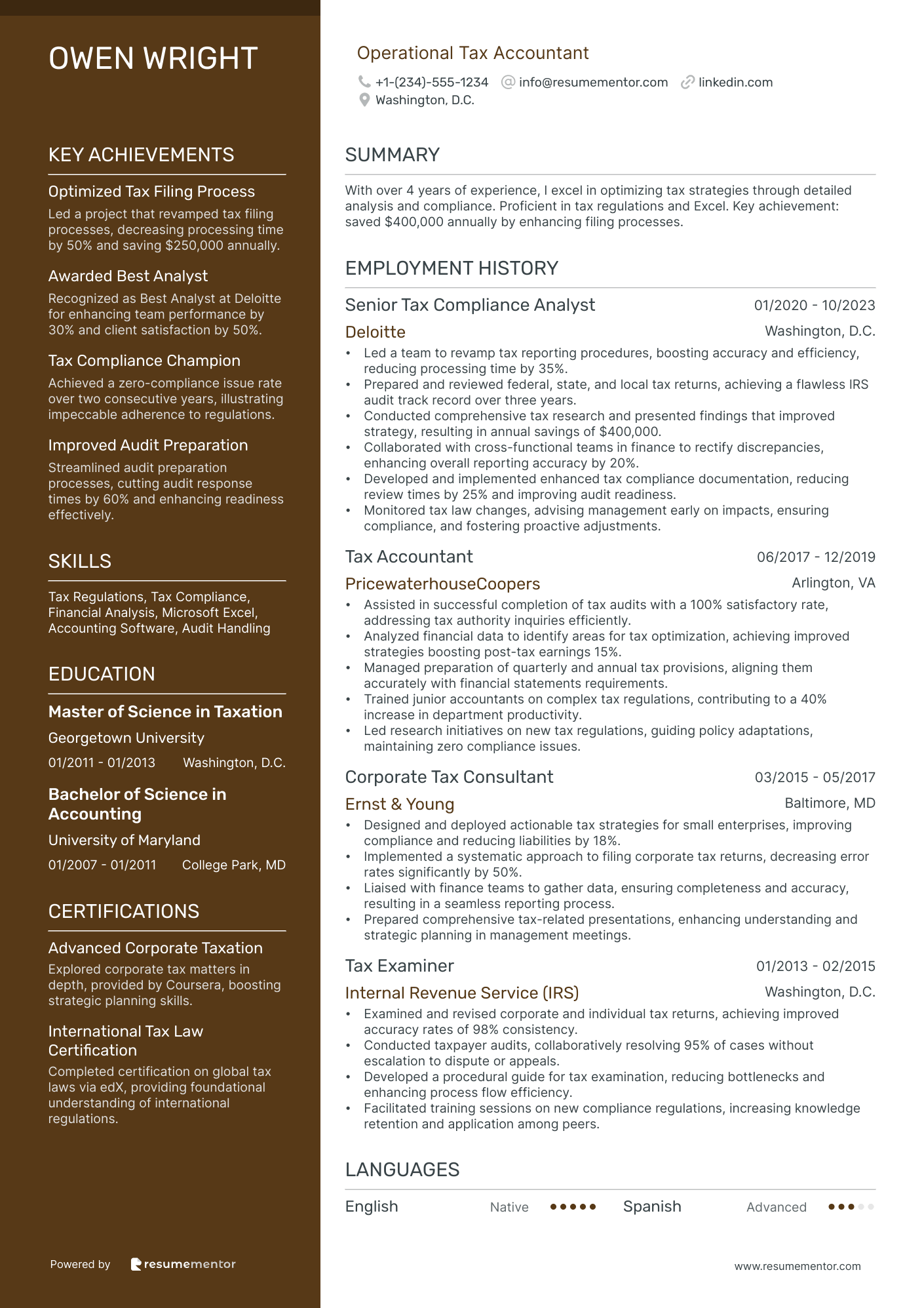
Operational Tax Accountant
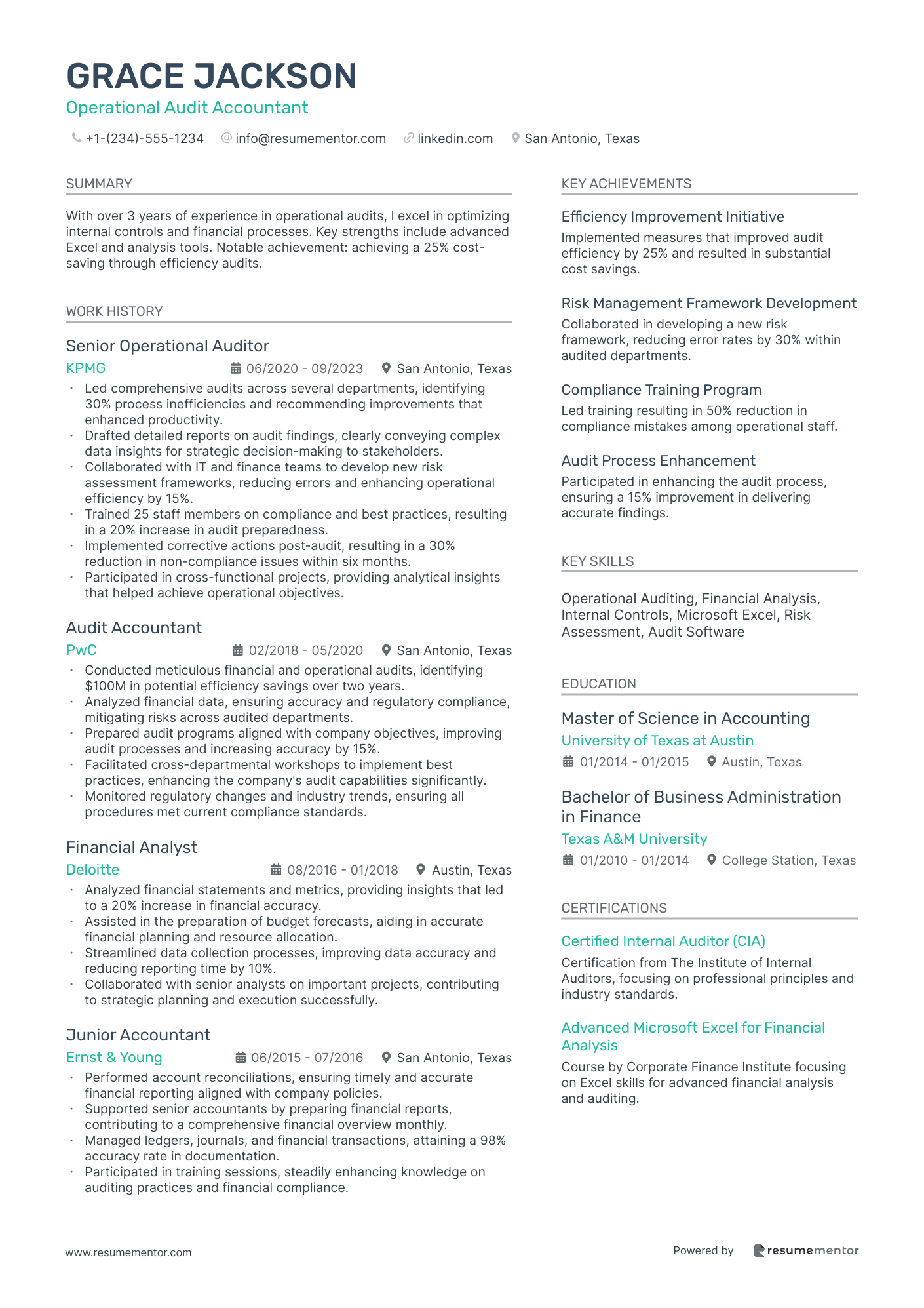
Operational Audit Accountant
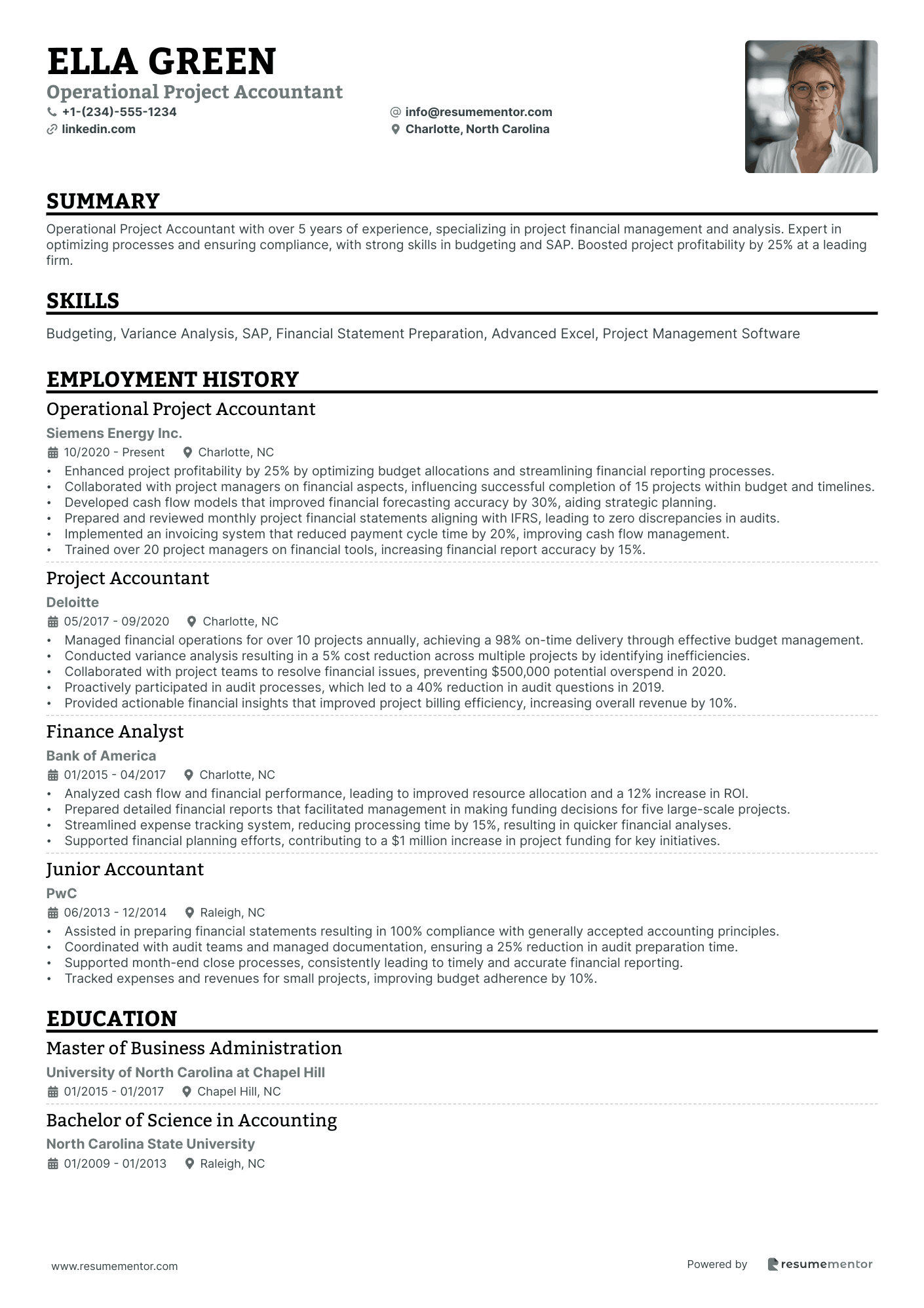
Operational Project Accountant
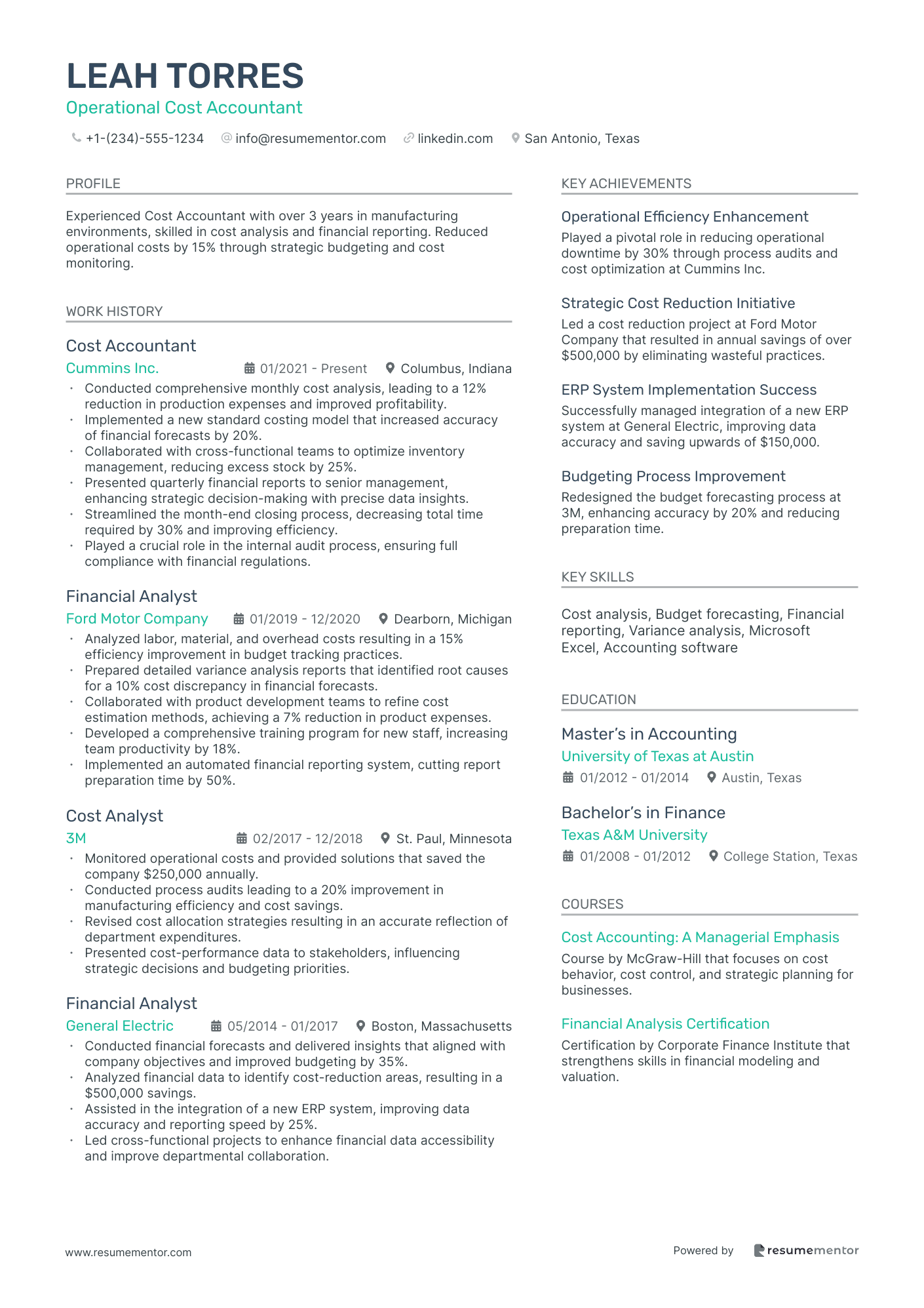
Operational Cost Accountant
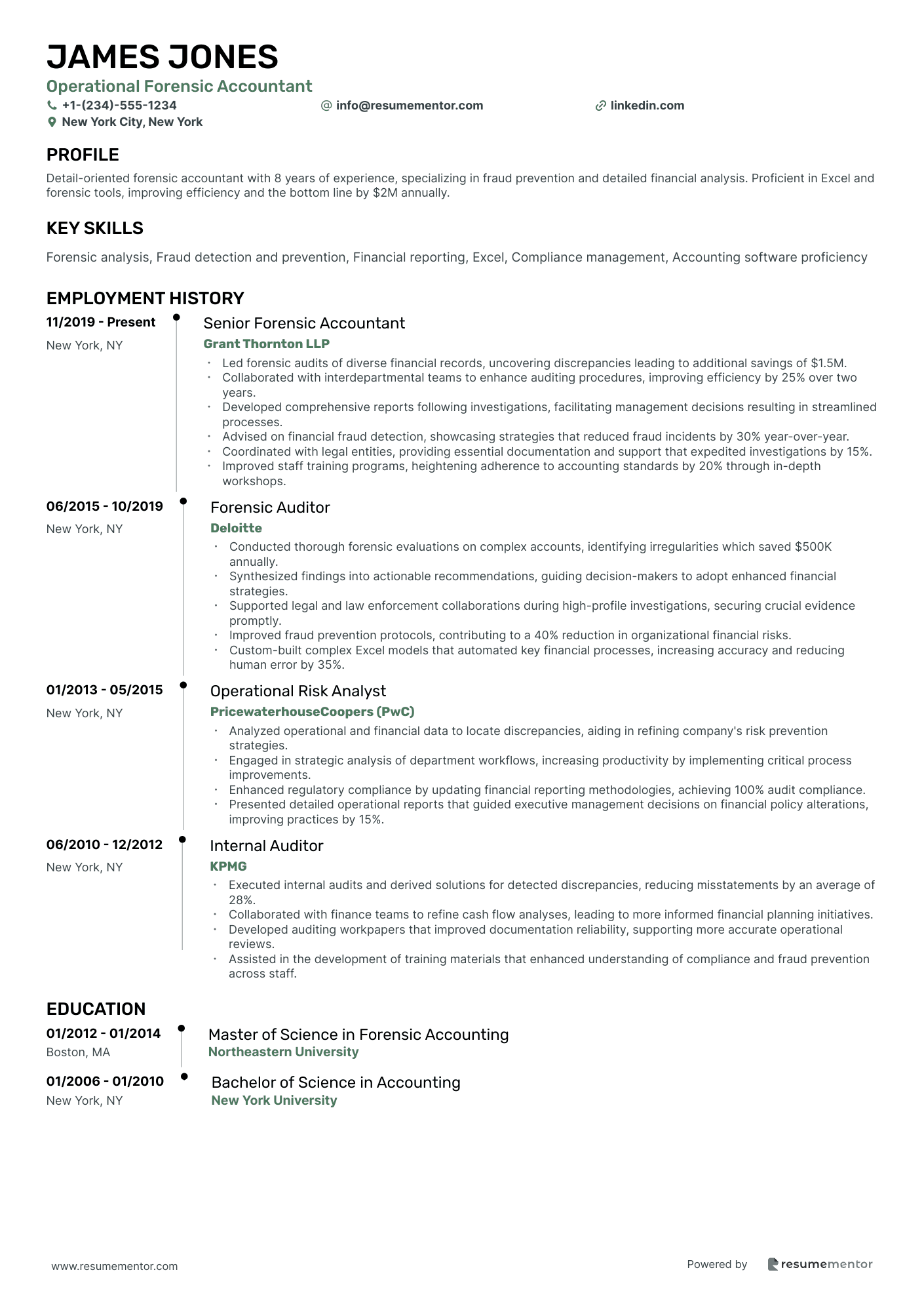
Operational Forensic Accountant
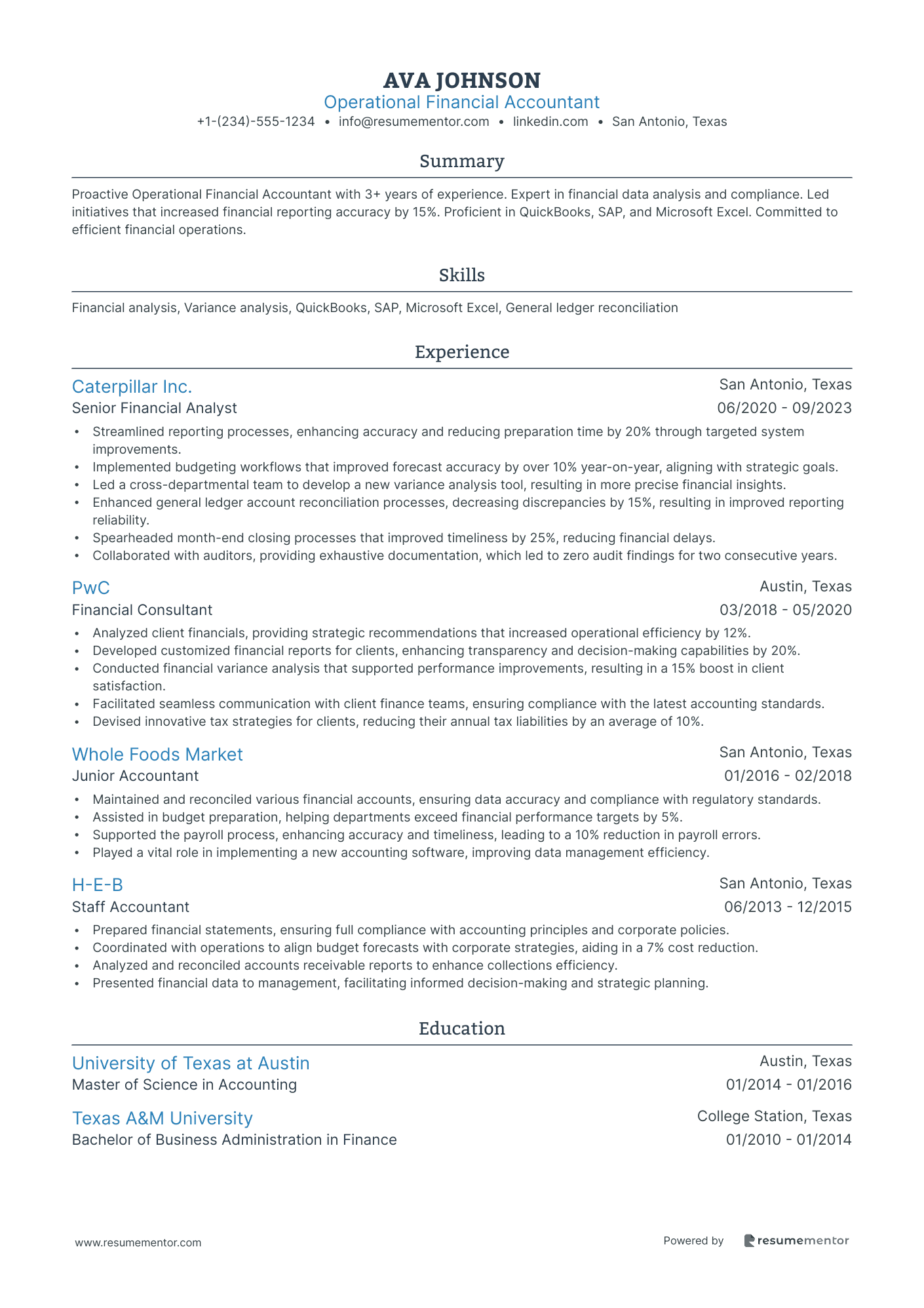
Operational Financial Accountant
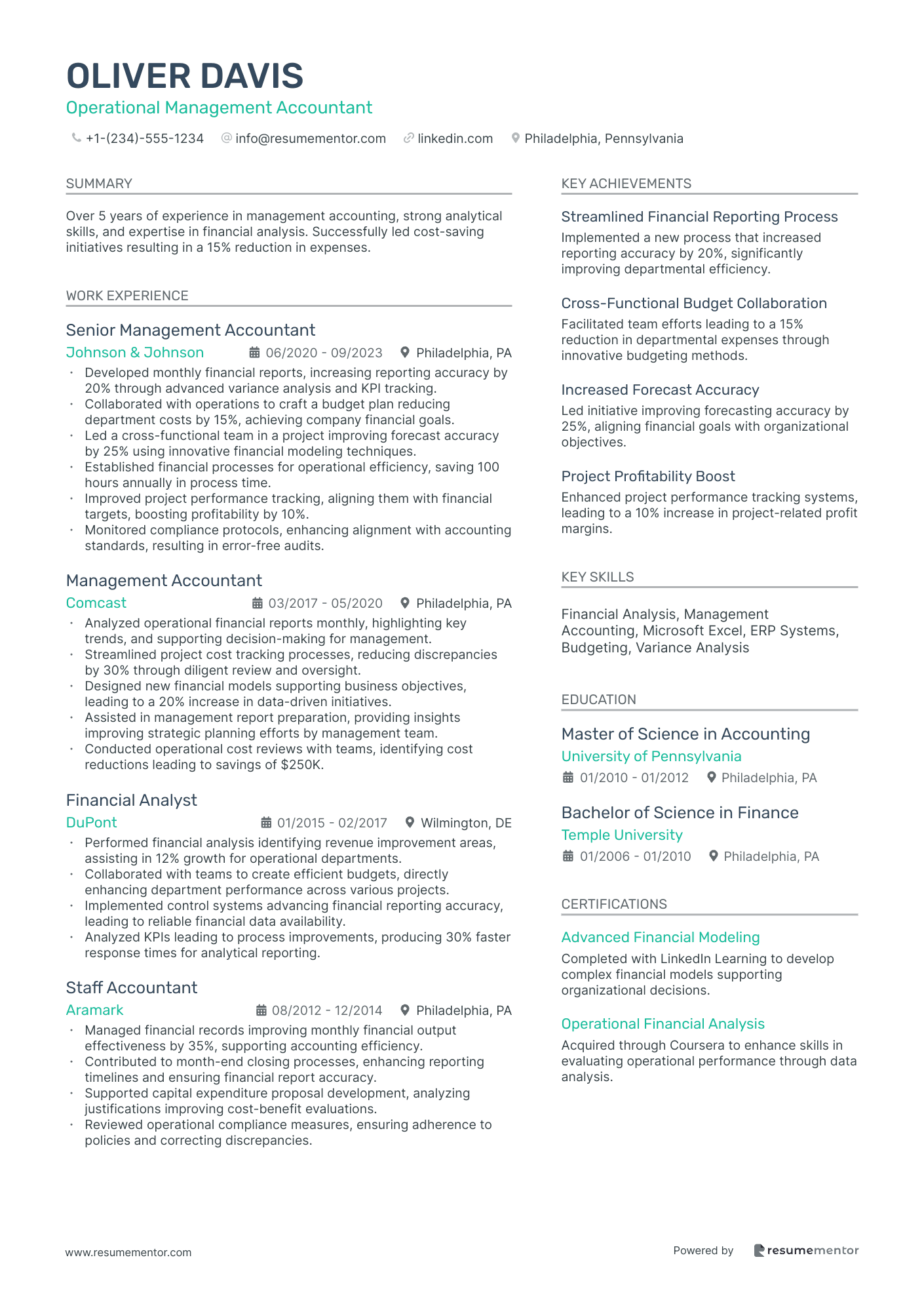
Operational Management Accountant
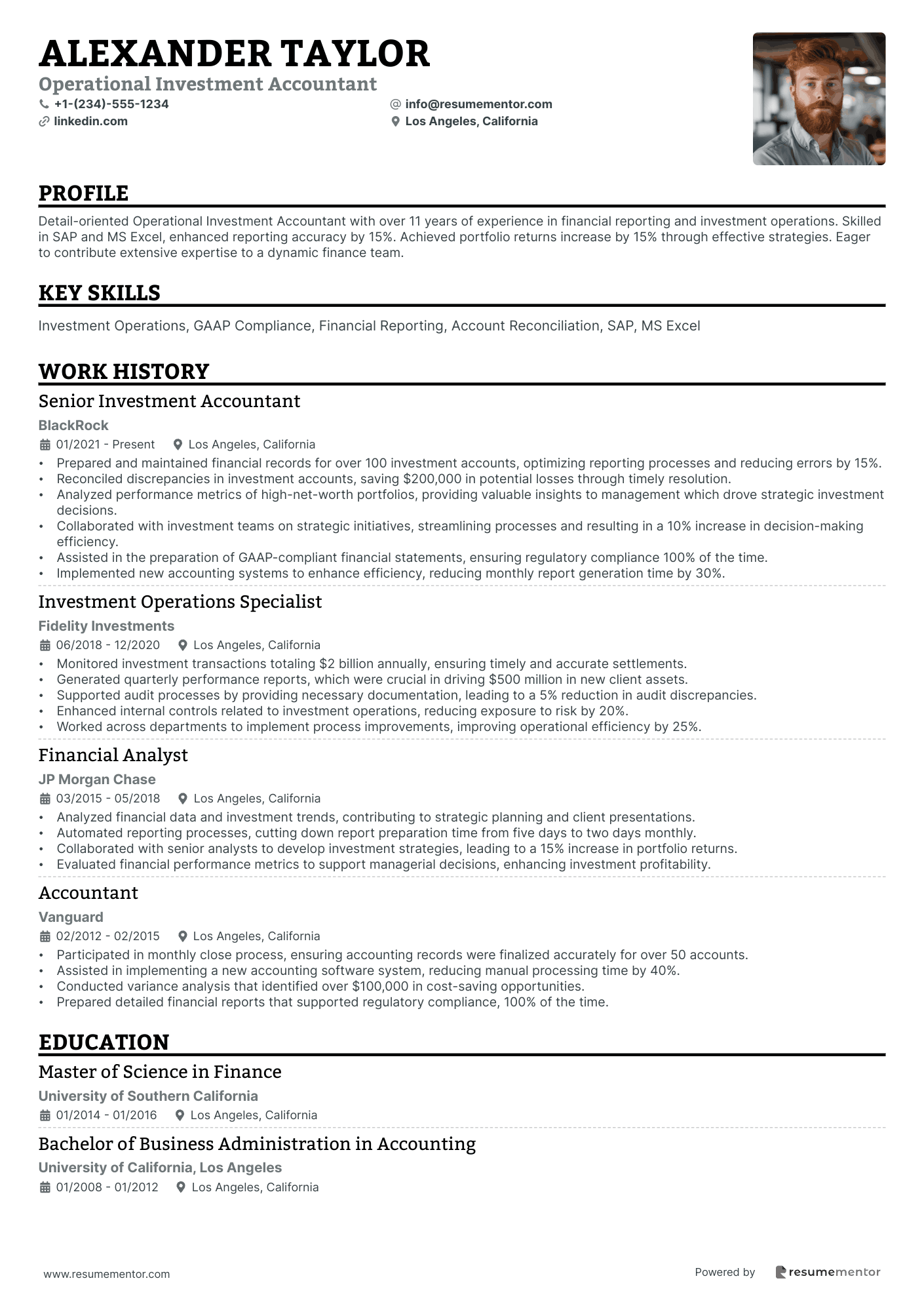
Operational Investment Accountant
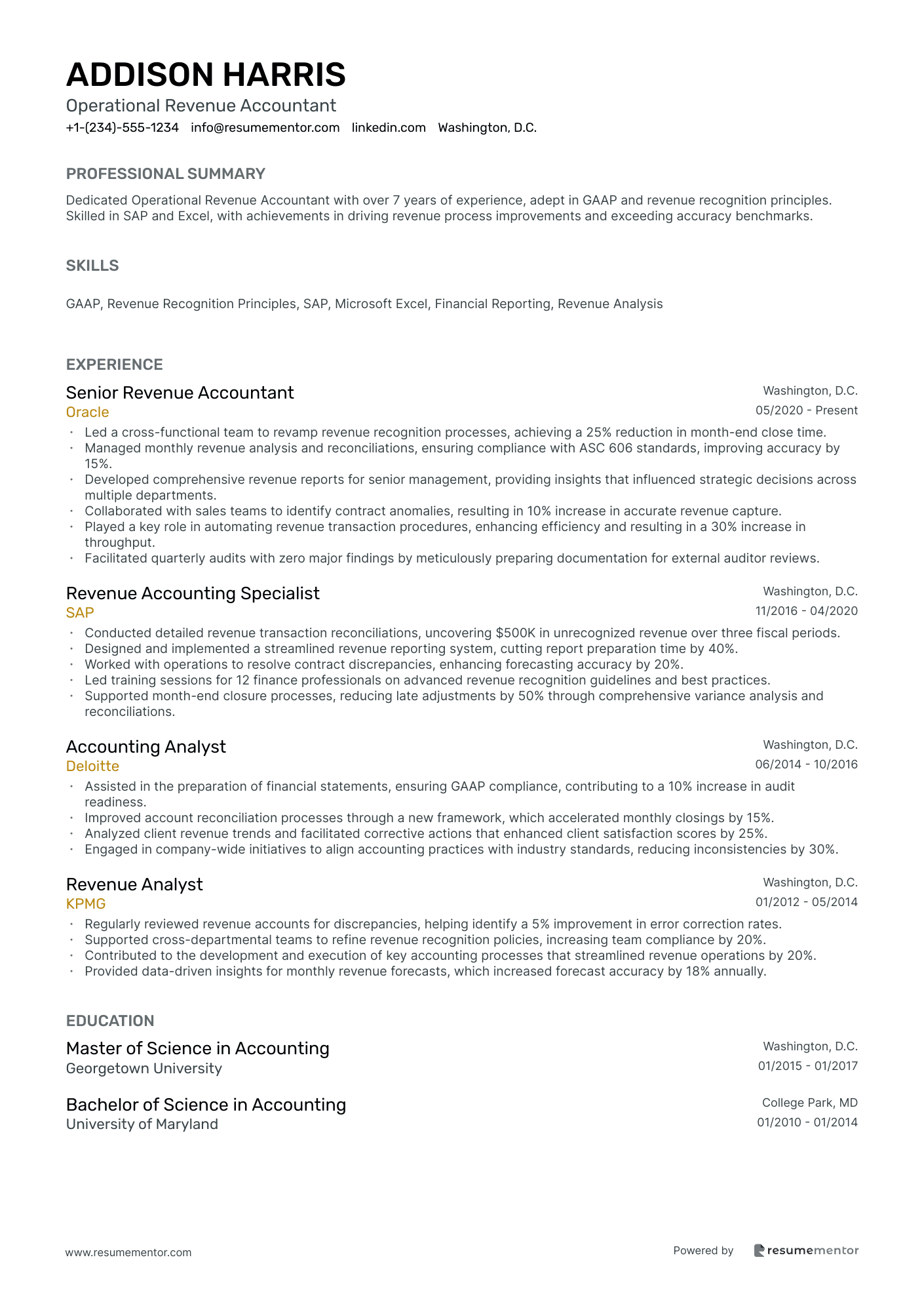
Operational Revenue Accountant
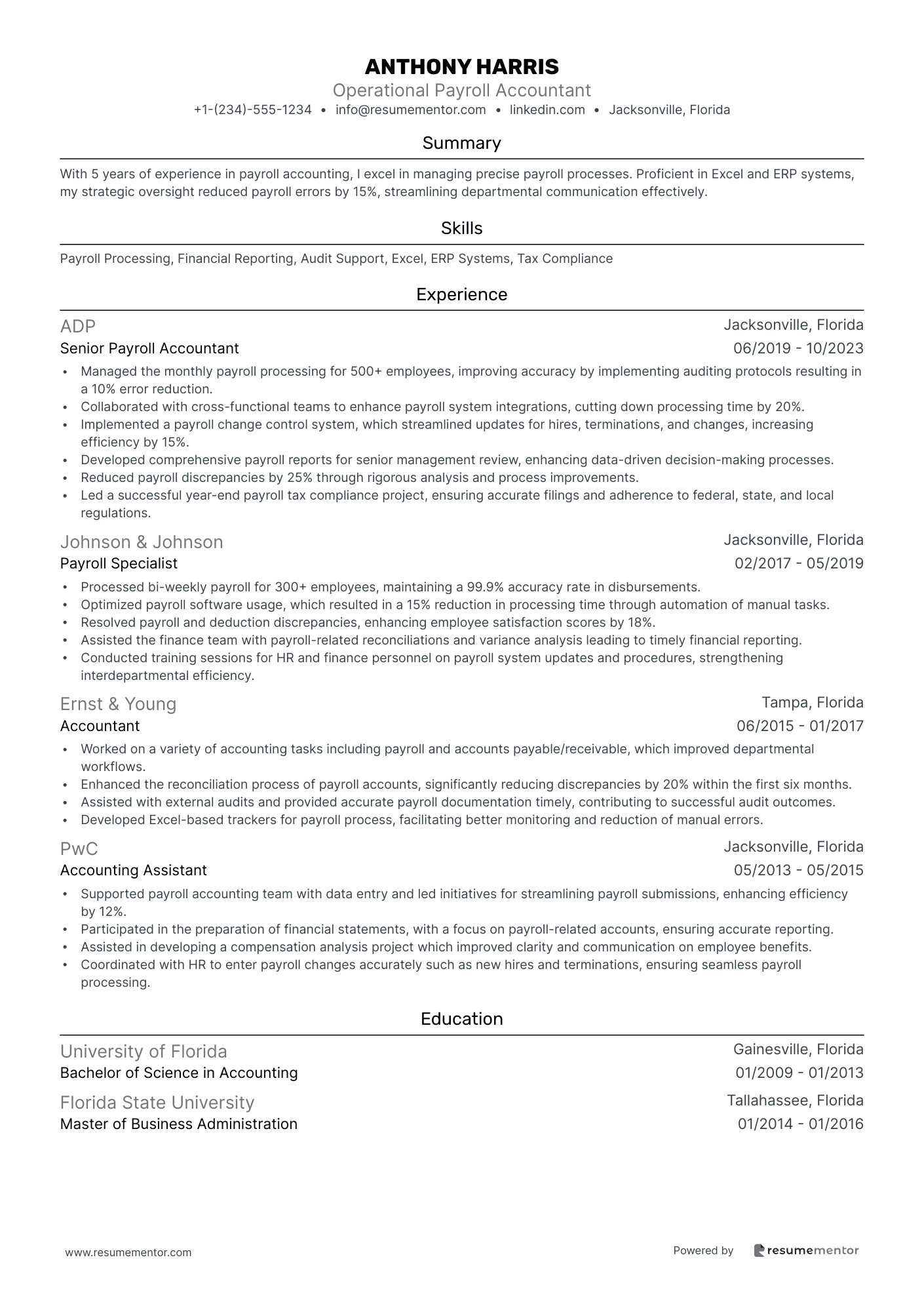
Operational Payroll Accountant

Operational Tax Accountant resume sample
- •Led a team to revamp tax reporting procedures, boosting accuracy and efficiency, reducing processing time by 35%.
- •Prepared and reviewed federal, state, and local tax returns, achieving a flawless IRS audit track record over three years.
- •Conducted comprehensive tax research and presented findings that improved strategy, resulting in annual savings of $400,000.
- •Collaborated with cross-functional teams in finance to rectify discrepancies, enhancing overall reporting accuracy by 20%.
- •Developed and implemented enhanced tax compliance documentation, reducing review times by 25% and improving audit readiness.
- •Monitored tax law changes, advising management early on impacts, ensuring compliance, and fostering proactive adjustments.
- •Assisted in successful completion of tax audits with a 100% satisfactory rate, addressing tax authority inquiries efficiently.
- •Analyzed financial data to identify areas for tax optimization, achieving improved strategies boosting post-tax earnings 15%.
- •Managed preparation of quarterly and annual tax provisions, aligning them accurately with financial statements requirements.
- •Trained junior accountants on complex tax regulations, contributing to a 40% increase in department productivity.
- •Led research initiatives on new tax regulations, guiding policy adaptations, maintaining zero compliance issues.
- •Designed and deployed actionable tax strategies for small enterprises, improving compliance and reducing liabilities by 18%.
- •Implemented a systematic approach to filing corporate tax returns, decreasing error rates significantly by 50%.
- •Liaised with finance teams to gather data, ensuring completeness and accuracy, resulting in a seamless reporting process.
- •Prepared comprehensive tax-related presentations, enhancing understanding and strategic planning in management meetings.
- •Examined and revised corporate and individual tax returns, achieving improved accuracy rates of 98% consistency.
- •Conducted taxpayer audits, collaboratively resolving 95% of cases without escalation to dispute or appeals.
- •Developed a procedural guide for tax examination, reducing bottlenecks and enhancing process flow efficiency.
- •Facilitated training sessions on new compliance regulations, increasing knowledge retention and application among peers.
Operational Audit Accountant resume sample
- •Led comprehensive audits across several departments, identifying 30% process inefficiencies and recommending improvements that enhanced productivity.
- •Drafted detailed reports on audit findings, clearly conveying complex data insights for strategic decision-making to stakeholders.
- •Collaborated with IT and finance teams to develop new risk assessment frameworks, reducing errors and enhancing operational efficiency by 15%.
- •Trained 25 staff members on compliance and best practices, resulting in a 20% increase in audit preparedness.
- •Implemented corrective actions post-audit, resulting in a 30% reduction in non-compliance issues within six months.
- •Participated in cross-functional projects, providing analytical insights that helped achieve operational objectives.
- •Conducted meticulous financial and operational audits, identifying $100M in potential efficiency savings over two years.
- •Analyzed financial data, ensuring accuracy and regulatory compliance, mitigating risks across audited departments.
- •Prepared audit programs aligned with company objectives, improving audit processes and increasing accuracy by 15%.
- •Facilitated cross-departmental workshops to implement best practices, enhancing the company's audit capabilities significantly.
- •Monitored regulatory changes and industry trends, ensuring all procedures met current compliance standards.
- •Analyzed financial statements and metrics, providing insights that led to a 20% increase in financial accuracy.
- •Assisted in the preparation of budget forecasts, aiding in accurate financial planning and resource allocation.
- •Streamlined data collection processes, improving data accuracy and reducing reporting time by 10%.
- •Collaborated with senior analysts on important projects, contributing to strategic planning and execution successfully.
- •Performed account reconciliations, ensuring timely and accurate financial reporting aligned with company policies.
- •Supported senior accountants by preparing financial reports, contributing to a comprehensive financial overview monthly.
- •Managed ledgers, journals, and financial transactions, attaining a 98% accuracy rate in documentation.
- •Participated in training sessions, steadily enhancing knowledge on auditing practices and financial compliance.
Operational Project Accountant resume sample
- •Enhanced project profitability by 25% by optimizing budget allocations and streamlining financial reporting processes.
- •Collaborated with project managers on financial aspects, influencing successful completion of 15 projects within budget and timelines.
- •Developed cash flow models that improved financial forecasting accuracy by 30%, aiding strategic planning.
- •Prepared and reviewed monthly project financial statements aligning with IFRS, leading to zero discrepancies in audits.
- •Implemented an invoicing system that reduced payment cycle time by 20%, improving cash flow management.
- •Trained over 20 project managers on financial tools, increasing financial report accuracy by 15%.
- •Managed financial operations for over 10 projects annually, achieving a 98% on-time delivery through effective budget management.
- •Conducted variance analysis resulting in a 5% cost reduction across multiple projects by identifying inefficiencies.
- •Collaborated with project teams to resolve financial issues, preventing $500,000 potential overspend in 2020.
- •Proactively participated in audit processes, which led to a 40% reduction in audit questions in 2019.
- •Provided actionable financial insights that improved project billing efficiency, increasing overall revenue by 10%.
- •Analyzed cash flow and financial performance, leading to improved resource allocation and a 12% increase in ROI.
- •Prepared detailed financial reports that facilitated management in making funding decisions for five large-scale projects.
- •Streamlined expense tracking system, reducing processing time by 15%, resulting in quicker financial analyses.
- •Supported financial planning efforts, contributing to a $1 million increase in project funding for key initiatives.
- •Assisted in preparing financial statements resulting in 100% compliance with generally accepted accounting principles.
- •Coordinated with audit teams and managed documentation, ensuring a 25% reduction in audit preparation time.
- •Supported month-end close processes, consistently leading to timely and accurate financial reporting.
- •Tracked expenses and revenues for small projects, improving budget adherence by 10%.
Operational Cost Accountant resume sample
- •Conducted comprehensive monthly cost analysis, leading to a 12% reduction in production expenses and improved profitability.
- •Implemented a new standard costing model that increased accuracy of financial forecasts by 20%.
- •Collaborated with cross-functional teams to optimize inventory management, reducing excess stock by 25%.
- •Presented quarterly financial reports to senior management, enhancing strategic decision-making with precise data insights.
- •Streamlined the month-end closing process, decreasing total time required by 30% and improving efficiency.
- •Played a crucial role in the internal audit process, ensuring full compliance with financial regulations.
- •Analyzed labor, material, and overhead costs resulting in a 15% efficiency improvement in budget tracking practices.
- •Prepared detailed variance analysis reports that identified root causes for a 10% cost discrepancy in financial forecasts.
- •Collaborated with product development teams to refine cost estimation methods, achieving a 7% reduction in product expenses.
- •Developed a comprehensive training program for new staff, increasing team productivity by 18%.
- •Implemented an automated financial reporting system, cutting report preparation time by 50%.
- •Monitored operational costs and provided solutions that saved the company $250,000 annually.
- •Conducted process audits leading to a 20% improvement in manufacturing efficiency and cost savings.
- •Revised cost allocation strategies resulting in an accurate reflection of department expenditures.
- •Presented cost-performance data to stakeholders, influencing strategic decisions and budgeting priorities.
- •Conducted financial forecasts and delivered insights that aligned with company objectives and improved budgeting by 35%.
- •Analyzed financial data to identify cost-reduction areas, resulting in a $500,000 savings.
- •Assisted in the integration of a new ERP system, improving data accuracy and reporting speed by 25%.
- •Led cross-functional projects to enhance financial data accessibility and improve departmental collaboration.
Operational Forensic Accountant resume sample
- •Led forensic audits of diverse financial records, uncovering discrepancies leading to additional savings of $1.5M.
- •Collaborated with interdepartmental teams to enhance auditing procedures, improving efficiency by 25% over two years.
- •Developed comprehensive reports following investigations, facilitating management decisions resulting in streamlined processes.
- •Advised on financial fraud detection, showcasing strategies that reduced fraud incidents by 30% year-over-year.
- •Coordinated with legal entities, providing essential documentation and support that expedited investigations by 15%.
- •Improved staff training programs, heightening adherence to accounting standards by 20% through in-depth workshops.
- •Conducted thorough forensic evaluations on complex accounts, identifying irregularities which saved $500K annually.
- •Synthesized findings into actionable recommendations, guiding decision-makers to adopt enhanced financial strategies.
- •Supported legal and law enforcement collaborations during high-profile investigations, securing crucial evidence promptly.
- •Improved fraud prevention protocols, contributing to a 40% reduction in organizational financial risks.
- •Custom-built complex Excel models that automated key financial processes, increasing accuracy and reducing human error by 35%.
- •Analyzed operational and financial data to locate discrepancies, aiding in refining company's risk prevention strategies.
- •Engaged in strategic analysis of department workflows, increasing productivity by implementing critical process improvements.
- •Enhanced regulatory compliance by updating financial reporting methodologies, achieving 100% audit compliance.
- •Presented detailed operational reports that guided executive management decisions on financial policy alterations, improving practices by 15%.
- •Executed internal audits and derived solutions for detected discrepancies, reducing misstatements by an average of 28%.
- •Collaborated with finance teams to refine cash flow analyses, leading to more informed financial planning initiatives.
- •Developed auditing workpapers that improved documentation reliability, supporting more accurate operational reviews.
- •Assisted in the development of training materials that enhanced understanding of compliance and fraud prevention across staff.
Operational Financial Accountant resume sample
- •Streamlined reporting processes, enhancing accuracy and reducing preparation time by 20% through targeted system improvements.
- •Implemented budgeting workflows that improved forecast accuracy by over 10% year-on-year, aligning with strategic goals.
- •Led a cross-departmental team to develop a new variance analysis tool, resulting in more precise financial insights.
- •Enhanced general ledger account reconciliation processes, decreasing discrepancies by 15%, resulting in improved reporting reliability.
- •Spearheaded month-end closing processes that improved timeliness by 25%, reducing financial delays.
- •Collaborated with auditors, providing exhaustive documentation, which led to zero audit findings for two consecutive years.
- •Analyzed client financials, providing strategic recommendations that increased operational efficiency by 12%.
- •Developed customized financial reports for clients, enhancing transparency and decision-making capabilities by 20%.
- •Conducted financial variance analysis that supported performance improvements, resulting in a 15% boost in client satisfaction.
- •Facilitated seamless communication with client finance teams, ensuring compliance with the latest accounting standards.
- •Devised innovative tax strategies for clients, reducing their annual tax liabilities by an average of 10%.
- •Maintained and reconciled various financial accounts, ensuring data accuracy and compliance with regulatory standards.
- •Assisted in budget preparation, helping departments exceed financial performance targets by 5%.
- •Supported the payroll process, enhancing accuracy and timeliness, leading to a 10% reduction in payroll errors.
- •Played a vital role in implementing a new accounting software, improving data management efficiency.
- •Prepared financial statements, ensuring full compliance with accounting principles and corporate policies.
- •Coordinated with operations to align budget forecasts with corporate strategies, aiding in a 7% cost reduction.
- •Analyzed and reconciled accounts receivable reports to enhance collections efficiency.
- •Presented financial data to management, facilitating informed decision-making and strategic planning.
Operational Management Accountant resume sample
- •Developed monthly financial reports, increasing reporting accuracy by 20% through advanced variance analysis and KPI tracking.
- •Collaborated with operations to craft a budget plan reducing department costs by 15%, achieving company financial goals.
- •Led a cross-functional team in a project improving forecast accuracy by 25% using innovative financial modeling techniques.
- •Established financial processes for operational efficiency, saving 100 hours annually in process time.
- •Improved project performance tracking, aligning them with financial targets, boosting profitability by 10%.
- •Monitored compliance protocols, enhancing alignment with accounting standards, resulting in error-free audits.
- •Analyzed operational financial reports monthly, highlighting key trends, and supporting decision-making for management.
- •Streamlined project cost tracking processes, reducing discrepancies by 30% through diligent review and oversight.
- •Designed new financial models supporting business objectives, leading to a 20% increase in data-driven initiatives.
- •Assisted in management report preparation, providing insights improving strategic planning efforts by management team.
- •Conducted operational cost reviews with teams, identifying cost reductions leading to savings of $250K.
- •Performed financial analysis identifying revenue improvement areas, assisting in 12% growth for operational departments.
- •Collaborated with teams to create efficient budgets, directly enhancing department performance across various projects.
- •Implemented control systems advancing financial reporting accuracy, leading to reliable financial data availability.
- •Analyzed KPIs leading to process improvements, producing 30% faster response times for analytical reporting.
- •Managed financial records improving monthly financial output effectiveness by 35%, supporting accounting efficiency.
- •Contributed to month-end closing processes, enhancing reporting timelines and ensuring financial report accuracy.
- •Supported capital expenditure proposal development, analyzing justifications improving cost-benefit evaluations.
- •Reviewed operational compliance measures, ensuring adherence to policies and correcting discrepancies.
Operational Investment Accountant resume sample
- •Prepared and maintained financial records for over 100 investment accounts, optimizing reporting processes and reducing errors by 15%.
- •Reconciled discrepancies in investment accounts, saving $200,000 in potential losses through timely resolution.
- •Analyzed performance metrics of high-net-worth portfolios, providing valuable insights to management which drove strategic investment decisions.
- •Collaborated with investment teams on strategic initiatives, streamlining processes and resulting in a 10% increase in decision-making efficiency.
- •Assisted in the preparation of GAAP-compliant financial statements, ensuring regulatory compliance 100% of the time.
- •Implemented new accounting systems to enhance efficiency, reducing monthly report generation time by 30%.
- •Monitored investment transactions totaling $2 billion annually, ensuring timely and accurate settlements.
- •Generated quarterly performance reports, which were crucial in driving $500 million in new client assets.
- •Supported audit processes by providing necessary documentation, leading to a 5% reduction in audit discrepancies.
- •Enhanced internal controls related to investment operations, reducing exposure to risk by 20%.
- •Worked across departments to implement process improvements, improving operational efficiency by 25%.
- •Analyzed financial data and investment trends, contributing to strategic planning and client presentations.
- •Automated reporting processes, cutting down report preparation time from five days to two days monthly.
- •Collaborated with senior analysts to develop investment strategies, leading to a 15% increase in portfolio returns.
- •Evaluated financial performance metrics to support managerial decisions, enhancing investment profitability.
- •Participated in monthly close process, ensuring accounting records were finalized accurately for over 50 accounts.
- •Assisted in implementing a new accounting software system, reducing manual processing time by 40%.
- •Conducted variance analysis that identified over $100,000 in cost-saving opportunities.
- •Prepared detailed financial reports that supported regulatory compliance, 100% of the time.
Operational Revenue Accountant resume sample
- •Led a cross-functional team to revamp revenue recognition processes, achieving a 25% reduction in month-end close time.
- •Managed monthly revenue analysis and reconciliations, ensuring compliance with ASC 606 standards, improving accuracy by 15%.
- •Developed comprehensive revenue reports for senior management, providing insights that influenced strategic decisions across multiple departments.
- •Collaborated with sales teams to identify contract anomalies, resulting in 10% increase in accurate revenue capture.
- •Played a key role in automating revenue transaction procedures, enhancing efficiency and resulting in a 30% increase in throughput.
- •Facilitated quarterly audits with zero major findings by meticulously preparing documentation for external auditor reviews.
- •Conducted detailed revenue transaction reconciliations, uncovering $500K in unrecognized revenue over three fiscal periods.
- •Designed and implemented a streamlined revenue reporting system, cutting report preparation time by 40%.
- •Worked with operations to resolve contract discrepancies, enhancing forecasting accuracy by 20%.
- •Led training sessions for 12 finance professionals on advanced revenue recognition guidelines and best practices.
- •Supported month-end closure processes, reducing late adjustments by 50% through comprehensive variance analysis and reconciliations.
- •Assisted in the preparation of financial statements, ensuring GAAP compliance, contributing to a 10% increase in audit readiness.
- •Improved account reconciliation processes through a new framework, which accelerated monthly closings by 15%.
- •Analyzed client revenue trends and facilitated corrective actions that enhanced client satisfaction scores by 25%.
- •Engaged in company-wide initiatives to align accounting practices with industry standards, reducing inconsistencies by 30%.
- •Regularly reviewed revenue accounts for discrepancies, helping identify a 5% improvement in error correction rates.
- •Supported cross-departmental teams to refine revenue recognition policies, increasing team compliance by 20%.
- •Contributed to the development and execution of key accounting processes that streamlined revenue operations by 20%.
- •Provided data-driven insights for monthly revenue forecasts, which increased forecast accuracy by 18% annually.
Operational Payroll Accountant resume sample
- •Managed the monthly payroll processing for 500+ employees, improving accuracy by implementing auditing protocols resulting in a 10% error reduction.
- •Collaborated with cross-functional teams to enhance payroll system integrations, cutting down processing time by 20%.
- •Implemented a payroll change control system, which streamlined updates for hires, terminations, and changes, increasing efficiency by 15%.
- •Developed comprehensive payroll reports for senior management review, enhancing data-driven decision-making processes.
- •Reduced payroll discrepancies by 25% through rigorous analysis and process improvements.
- •Led a successful year-end payroll tax compliance project, ensuring accurate filings and adherence to federal, state, and local regulations.
- •Processed bi-weekly payroll for 300+ employees, maintaining a 99.9% accuracy rate in disbursements.
- •Optimized payroll software usage, which resulted in a 15% reduction in processing time through automation of manual tasks.
- •Resolved payroll and deduction discrepancies, enhancing employee satisfaction scores by 18%.
- •Assisted the finance team with payroll-related reconciliations and variance analysis leading to timely financial reporting.
- •Conducted training sessions for HR and finance personnel on payroll system updates and procedures, strengthening interdepartmental efficiency.
- •Worked on a variety of accounting tasks including payroll and accounts payable/receivable, which improved departmental workflows.
- •Enhanced the reconciliation process of payroll accounts, significantly reducing discrepancies by 20% within the first six months.
- •Assisted with external audits and provided accurate payroll documentation timely, contributing to successful audit outcomes.
- •Developed Excel-based trackers for payroll process, facilitating better monitoring and reduction of manual errors.
- •Supported payroll accounting team with data entry and led initiatives for streamlining payroll submissions, enhancing efficiency by 12%.
- •Participated in the preparation of financial statements, with a focus on payroll-related accounts, ensuring accurate reporting.
- •Assisted in developing a compensation analysis project which improved clarity and communication on employee benefits.
- •Coordinated with HR to enter payroll changes accurately such as new hires and terminations, ensuring seamless payroll processing.
In the world of finance, as an operational accountant, you ensure the smooth running of a company’s critical processes. Your resume acts as your handshake to potential employers when you’re on the job hunt, so crafting it can feel overwhelming. Articulating your technical expertise in managing systems, numbers, and reports requires more than just listing your job titles. It’s like turning a complex financial statement into a compelling story that engages and impresses.
That’s where a resume template can be immensely valuable. It helps you present a clear, concise picture of your career journey and achievements. By framing your skills effectively, a template saves you time and highlights the details that recruiters need to see.
To start on the right foot, explore these resume templates that can guide you in showcasing your unique contributions in past roles. They provide a structured way to organize your accomplishments and skills, making sure your experience doesn’t go unnoticed.
As you craft your resume, ensure it reflects not only your expertise in operational accounting but also your ability to drive results within an organization. Clarity and directness are essential in a fast-paced industry. A well-constructed resume can unlock exciting new career opportunities. Let’s dive into crafting a career narrative that propels you towards the role you desire.
Key Takeaways
- A teacher resume should effectively communicate teaching experience and skills relevant to the job applied for, tailored to showcase educational impact and leadership qualities.
- The resume format is important, with a reverse chronological layout typically being the most effective for showing career progression and recent accomplishments.
- Including a strong professional summary at the beginning can capture the attention of recruiters by highlighting key skills and achievements in a succinct manner.
- Emphasizing quantifiable achievements in the experience section can demonstrate tangible impacts and effectiveness as an educator, enhancing the appeal of the resume.
- Skills should be relevant and encompass both teaching-specific abilities and general competencies that align with the school or educational institution’s objectives.
What to focus on when writing your operational accountant resume
An operational accountant resume should clearly communicate your accounting expertise and your ability to manage financial operations smoothly. Start by highlighting skills in budgeting, financial reporting, and account management to assure the recruiter of your proficiency in these areas.
How to structure your operational accountant resume
- Contact Information — Ensure this section is straightforward yet professional. This is your first impression, so accuracy and professionalism are key. Make sure your LinkedIn profile links directly to a polished page, reinforcing your professional identity.
- Professional Summary — This section serves as your elevator pitch. It should briefly capture your wealth of experience while focusing on your strengths in financial operations. Mentioning certifications like CPA or CMA here can immediately position you as a knowledgeable candidate who meets professional standards.
- Work Experience — Focus on achievements in your previous roles. Detail responsibilities like financial reporting and budget management by quantifying your successes where possible. This demonstrates not just your duties, but your track record of creating value and efficiency.
- Education — Here, emphasize the relevance of your academic background to operational accounting. If your education includes specialized coursework in areas like financial management or accounting principles, make sure to highlight these to underline your thorough preparation for the role.
- Key Skills — This section should reflect both your technical and soft skills. It's crucial to spotlight areas such as financial analysis and proficiency in accounting software like QuickBooks, along with softer skills like attention to detail and analytical thinking, to present a comprehensive skill set.
- Achievements — Use this section to display concrete examples of your impact. Specific achievements, like cost reductions or implemented financial strategies, evidence your ability to produce tangible benefits through your expertise.
Using the above framework, you can structure your resume effectively. In the next section, we'll provide more in-depth insights on crafting each part of your operational accountant resume.
Which resume format to choose
Crafting an operational accountant resume starts with choosing the right format. A reverse-chronological layout is ideal because it puts the spotlight on your recent experience and achievements, which are key factors in showcasing your expertise in accounting roles. To add a modern touch and maintain professionalism, select fonts like Lato, Montserrat, or Raleway. These fonts help your document stand out while remaining easy to read.
Saving your resume as a PDF is crucial, as it preserves your formatting, ensuring that your resume looks the same on any device or printer. Consistent one-inch margins around the document lend a clean, organized appearance, making it easier for hiring managers to focus on your qualifications and experience.
By considering these elements, you ensure that your resume not only looks polished but also effectively communicates your skills and accomplishments to potential employers.
How to write a quantifiable resume experience section
As an operational accountant, your experience section is essential for highlighting your strengths and achievements. This part of your resume is where you demonstrate the hands-on aspects of your career that align with the roles you're pursuing. To make it impactful, focus on measurable successes and adjust the content to fit the specific job description you're aiming for. Arrange it in reverse chronological order so that your most recent roles stand out. Typically, you should include up to 10-15 years of experience unless older positions are highly relevant. Highlight job titles that directly relate to operational accounting to show progress and relevance. Tailor your resume by incorporating specific keywords and relevant skills from the job ad. Choose action verbs like “optimized,” “executed,” “streamlined,” and “reconciled” to effectively convey your impact.
- •Optimized month-end closing processes, reducing closing time by 30%.
- •Led a team in reconciling accounts, achieving a 99% error reduction rate.
- •Streamlined expense reporting procedures, saving the company $50K annually.
- •Implemented a new budgeting system, increasing forecasting accuracy by 25%.
The experience section stands out because it highlights specific skills and quantifiable results that are vital in operational accounting. Using strong action verbs alongside measurable outcomes, such as reducing closing times by 30% and saving $50K annually, it clearly communicates your contributions. Each bullet point focuses on achievements rather than just daily tasks, aligning with what employers seek in potential candidates. Professionally structured with pertinent job titles and dates, it immediately shows a clear career trajectory.
This arrangement ensures that your most relevant experience captures attention quickly. By listing roles in reverse chronological order, your recent accomplishments are immediately visible, making it easier for potential employers to find essential information. Tailoring the content with industry-specific terms aids in getting through applicant tracking systems. The smooth flow of information builds a cohesive picture of your skills and successes, making it compelling for hiring managers in the accounting field.
Achievement-Focused resume experience section
A well-crafted operational accountant achievement-focused resume experience section should highlight your accomplishments through specific, quantifiable outcomes. Pinpoint the operations and projects where you've made a significant impact, showing how your contributions advanced the company’s objectives. Use numbers and tangible results to enhance the visibility of your achievements and emphasize their value.
Make sure each bullet point starts with an action verb and succinctly showcases relevant skills that align with the job you’re targeting. By aligning your achievements with the prospective employer's needs, you can clearly demonstrate your value. Keep your points concise and directly related to the role to leave a powerful impression.
Operational Accountant
FinCorp Solutions
January 2020 - Present
- Cut monthly financial report closing time from 10 days to 5 by streamlining processes.
- Introduced a new reconciliation system that boosted accuracy by 30% and lowered audit findings.
- Created a cost-saving strategy that reduced overhead by 15% annually through smarter resource allocation.
- Worked with IT to automate data entry, saving the team 20 hours of manual work each week.
Customer-Focused resume experience section
A customer-focused operational accountant resume experience section should effectively highlight how you can handle customer interactions and financial operations. Start by identifying your key actions and achievements that show your capability in managing client accounts, resolving billing issues, and improving processes. Clearly communicate how these actions led to positive outcomes, and whenever possible, quantify your achievements with numbers or percentages to illustrate their impact. This approach helps demonstrate your effectiveness and value to potential employers.
To enhance readability, ensure that your experience section emphasizes responsibilities that improve the customer experience. Use active verbs that convey action and success, and explain how you worked directly with customers to resolve issues or enhance services, mentioning any tools or techniques you used. This highlights your commitment to both customer service and operational excellence, making your resume stand out to hiring managers or employers.
Operational Accountant
Accounting Solutions Inc.
January 2020 - Present
- Resolved 95% of customer billing inquiries within 24 hours, which boosted customer satisfaction and reduced the need for follow-up calls.
- Developed a streamlined reporting system to reduce data entry errors by 30%, leading to more accurate billing and stronger client trust.
- Collaborated with sales and support teams to identify customer pain points, resulting in new policies that enhanced service delivery.
- Introduced a new software solution to increase the speed of financial reporting by 20%, ensuring clients received timely and accurate information.
Growth-Focused resume experience section
A growth-focused operational accountant resume experience section should clearly demonstrate how you have supported financial efficiency and business expansion. Begin each entry with precise dates and a descriptive job title, while highlighting specific achievements that reflect your commitment to growth. By incorporating metrics and tangible outcomes, you can show how your actions have directly influenced the organization's success. This approach means detailing processes you've improved, profits you've increased, or technologies you've leveraged to enhance productivity and drive results.
Instead of listing daily tasks, focus on illustrating the measurable impacts of your work, such as cost savings or revenue growth, which showcase your ability to increase operational efficiency while aligning with strategic goals. Employers are interested in understanding how your expertise makes a real difference, so use figures and examples to illustrate your proactive approach to seizing opportunities and implementing innovative solutions. Each bullet should weave a narrative of your contributions and how they've amplified the organization's objectives.
Senior Operational Accountant
Finance Solutions Inc.
Jan 2018 - Present
- Reduced operational costs by 15% through strategic vendor negotiations and process improvements.
- Implemented new accounting software, cutting report preparation time by 40% and increasing accuracy.
- Led a team to streamline budgeting processes, resulting in a 20% decrease in unnecessary expenditures.
- Developed financial forecasts that contributed to a 25% increase in quarterly revenue, aligning with company growth targets.
Problem-Solving Focused resume experience section
A problem-solving-focused operational accountant resume experience section should clearly demonstrate how your skills have positively impacted previous employers. Begin each bullet with a powerful action verb and outline the specific problem you encountered along with the solution you implemented. By detailing the results, using numbers or percentages, you can effectively highlight your achievements. Keeping the language straightforward will help communicate your contributions clearly.
To write this section effectively, consider times when your problem-solving skills made a real difference. Reflect on the problems you faced, describing the steps you took to address them and any challenges you overcame. This will showcase your ability to deliver effective solutions and emphasize your role in successful outcomes. Highlight your analytical skills and efficiency in resolving issues to present a compelling narrative of your professional journey.
Operational Accountant
Tech Solutions Inc.
January 2020 - Present
- Streamlined monthly financial closing process, reducing time taken by 25% through automation.
- Designed and implemented a new reconciliation protocol, which decreased errors by 30%.
- Led a team to identify cost-saving opportunities, resulting in annual savings of $50,000.
- Collaborated with IT department to integrate accounting software, enhancing data accuracy.
Write your operational accountant resume summary section
A well-focused operational accountant resume should start with a summary that captures your experience and accomplishments. For those with years of practice, the summary should effectively spotlight your skills. Here's an example to guide you:
This summary blends your experience and skills, showing how they translate into tangible results that benefit employers. It's more than a simple list; it's a story about your professional journey and its impact. Describing yourself this way is essential. Active and result-oriented language keeps the reader engaged, focusing on outcomes like cost reduction or improved processes, which prospective employers find compelling.
Understanding the difference between a resume summary and other components is key for tailoring your resume effectively. A summary is ideal for those with experience, showcasing key achievements and skills. In contrast, a resume objective suits newcomers, stating career goals within a job role. A resume profile is broader, embracing both skills and future career paths. Meanwhile, a summary of qualifications highlights key achievements in bullet points. Each section serves its distinct purpose, based on where you are in your career.
Listing your operational accountant skills on your resume
A skills-focused operational accountant resume should clearly showcase what makes you a valuable asset to potential employers. When structuring your resume, you can either highlight your skills in their own section or integrate them throughout your experience and summary areas. Highlighting strengths and soft skills involves emphasizing your personal qualities that enhance interactions, problem-solving, and task management. Hard skills, in contrast, detail the specific technical expertise and knowledge you possess for executing job responsibilities effectively.
Utilizing skills and strengths as resume keywords is key to increasing your visibility to employers and ensuring your resume stands out in digital searches. Here’s how a focused skills section should look:
This layout selects essential skills like budgeting and financial reporting, presenting them in a clean and easy-to-understand way that appeals to hiring managers. With a clear focus on relevant expertise, it significantly strengthens your resume.
Best hard skills to feature on your operational accountant resume
For an operational accountant, hard skills should demonstrate your technical prowess in handling financial tasks and data processes accurately. These skills highlight your analytical edge, precision in details, and expertise in financial assessments. Consider these vital hard skills:
Hard Skills
- Financial Analysis
- Budgeting
- Accounts Payable & Receivable
- Tax Preparation
- Advanced Excel
- Financial Reporting
- Reconciliation
- Accounting Software (e.g., SAP, QuickBooks)
- Compliance and Regulations
- Auditing
- Strategic Planning
- Risk Management
- Data Entry
- Payroll Management
- Cost Accounting
Best soft skills to feature on your operational accountant resume
In addition, your soft skills should convey your ability to collaborate effectively with colleagues and manage time efficiently. These skills depict your communication style, critical thinking, and teamwork capabilities, which are crucial for success in any work environment. Aim to illustrate the following soft skills:
Soft Skills
- Attention to Detail
- Problem Solving
- Time Management
- Team Collaboration
- Effective Communication
- Adaptability
- Critical Thinking
- Organizational Skills
- Conflict Resolution
- Dependability
- Leadership
- Interpersonal Skills
- Customer Service
- Initiative
- Stress Management
How to include your education on your resume
The education section on your resume is crucial in showcasing your qualifications for a role as an operational accountant. It is essential to tailor this section to align with the job you're applying for, ensuring that irrelevant education is omitted. Highlighting your educational background effectively can demonstrate your knowledge and readiness for the position. When listing your degree, always mention the specific degree earned and any honors, such as cum laude, which indicates academic excellence. Including your GPA can also be beneficial if it is impressive; typically, a GPA of 3.5 or higher is considered strong. Be sure to specify both the GPA and the scale, like 3.8/4.0, to provide clear context. Properly formatting your education section can make a significant impact.
Unfortunately, here’s a poor example:
And now, here is an effective example:
The second example is effective because it highlights relevant education for an operational accountant role, emphasizing a degree in Accounting. It also mentions the distinction of graduating cum laude, which shows academic excellence, along with a solid GPA of 3.7/4.0. This information is presented concisely, allowing potential employers to quickly see the applicant's qualifications.
How to include operational accountant certificates on your resume
Including a certificates section in your operational accountant resume is crucial. Certificates showcase your qualifications and expertise, making your resume stand out. You can also include key certificates in the header of your resume.
List the name of the certificate first. Include the date you received it. Add the issuing organization. If space is limited, abbreviate where possible.
For example, in your resume header: John Doe, CPA, CFE
Here's a good example of a standalone certificates section:
This example is effective because it lists relevant and respected certifications for an operational accountant. The titles are clear, and the issuing organizations are well-known. Such information helps in gaining the employer's trust.
Extra sections to include in your operational accountant resume
Crafting a compelling resume for an operational accountant can truly set you apart in the job market. Adding diverse sections, such as languages, hobbies, volunteer work, and books, can demonstrate your well-rounded personality and make your application more engaging. Here's how you can effectively incorporate these sections:
- Language section — Highlight your bilingual or multilingual skills to show your ability to communicate with diverse clients and colleagues. Including this can demonstrate your adaptability and broad skill set.
- Hobbies and interests section — Mention hobbies that reflect qualities like attention to detail, such as chess or puzzle-solving. This helps show transferable skills that might not be industry-specific but are still valuable.
- Volunteer work section — Include volunteer roles where financial skills were used, like managing budgets for a nonprofit. This can show your commitment to community and your practical accounting experience outside of traditional work settings.
- Books section — List titles of accounting, finance, or personal development books you’ve read recently to show your dedication to continual learning. Reading industry-related books can highlight your interest and knowledge in your field.
Incorporating these sections effectively adds a personal touch and demonstrates your multifaceted capabilities to potential employers. This approach helps make your resume stand out in a competitive field.
In Conclusion
In conclusion, creating an operational accountant resume that resonates with hiring managers requires a comprehensive approach that blends clarity, precision, and value demonstration. Your resume should narrate a career story that not only highlights your technical prowess in financial analysis, budget management, and accounting operations but also clearly articulates your achievements in these areas. Using a dependable resume template can simplify this task, ensuring a structured and impactful presentation of your career highlights. It is vital to spotlight specific accomplishments through numbers and metrics, as this approach effectively showcases your ability to drive efficiency and growth within an organization. A thoughtful layout choice, such as a reverse-chronological format, ensures your most recent and pertinent experiences get the attention they deserve. Additionally, including education, certifications, and extra-curricular interests adds depth to your application, painting you as a well-rounded candidate. Your resume is more than a list of past jobs; it's a reflection of your career aspirations and achievements, aimed at securing new professional opportunities. Through careful composition and strategic content, your resume can open doors to exciting new roles where you can further excel and contribute your expertise in operational accounting. Keep your focus on delivering a concise, results-driven document that stands out in the fast-paced financial sector.
Related Articles

Continue Reading
Check more recommended readings to get the job of your dreams.
Resume
Resources
Tools
© 2026. All rights reserved.
Made with love by people who care.

